Cheltenham Festival lines up to earn millions for horseracing
- Published
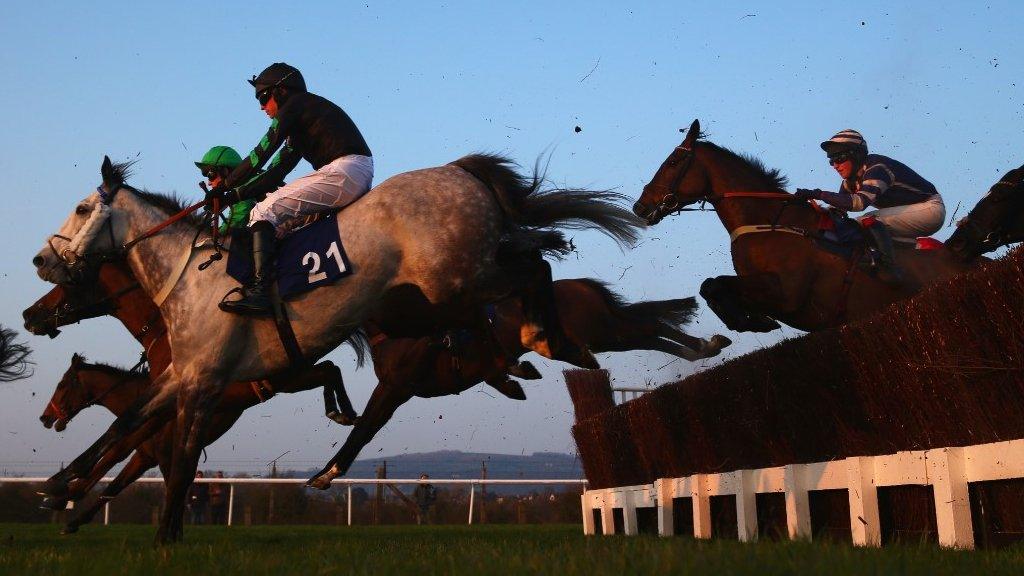
The world's biggest National Hunt horse racing event canters into Cheltenham this week, providing a huge financial boost to both the sport and the local economy.
The Cheltenham Festival is the pinnacle of the sport's jump racing calendar, attracting huge crowds and interest not only within the UK, but also from Ireland and further afield.
The event brings in more than £20m through ticket sales, hospitality, sponsorship and other income, and there is some £4.3m in prize money on offer, the most of any jump festival in the world. Meanwhile the four-day event is also estimated to bring in £100m to the wider Gloucestershire economy.
The 28-race steeplechase event is run by the Jockey Club and culminates in the Gold Cup day on Friday.
On average some 65,000 people will attend the event each day, spending money on accommodation, food and drink, and betting.
Indeed such is the scale of the event that work on it starts the previous autumn.
Sport investment
"At the Jockey Club we reinvest all the money we make back into horseracing," Cheltenham Racecourse managing director Ian Renton tells the BBC.
"So Cheltenham contributes a significant proportion of our total revenues for the year - it is very important for us to be able to put this money back into racing."
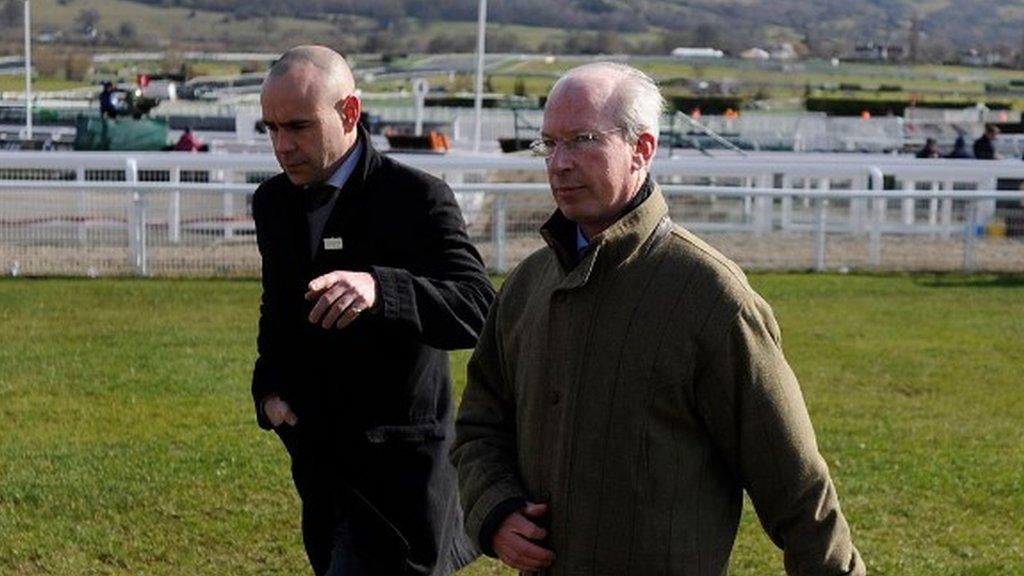
Cheltenham managing director Ian Renton (right) inspects the course
In financial terms, the event is the UK's second largest racing festival after the flat racing at Royal Ascot, which lasts one day longer.
The Jockey Club is the largest commercial group in British horseracing, with other assets including Aintree, Epsom Downs and Newmarket racecourses. It is governed by Royal Charter, with all profits invested back into the sport.
This year's festival is the first to be covered by ITV, as part of a four-year deal with The Jockey Club that will see horse racing have the most free-to-air coverage of any sport in the UK.
Hospitality sales
The 2017 gathering is also the second since the £45m revamp of the course, which included building a new grandstand.
That investment in facilities has enabled organisers to nearly double their income from hospitality, from £4.7m four years ago, to £9m now.
"We have also installed a very pro-active sales team," says Mr Renton. "We have also brought a lot of our sales in-house from agencies, which we believe has allowed us to provide excellent value for money."
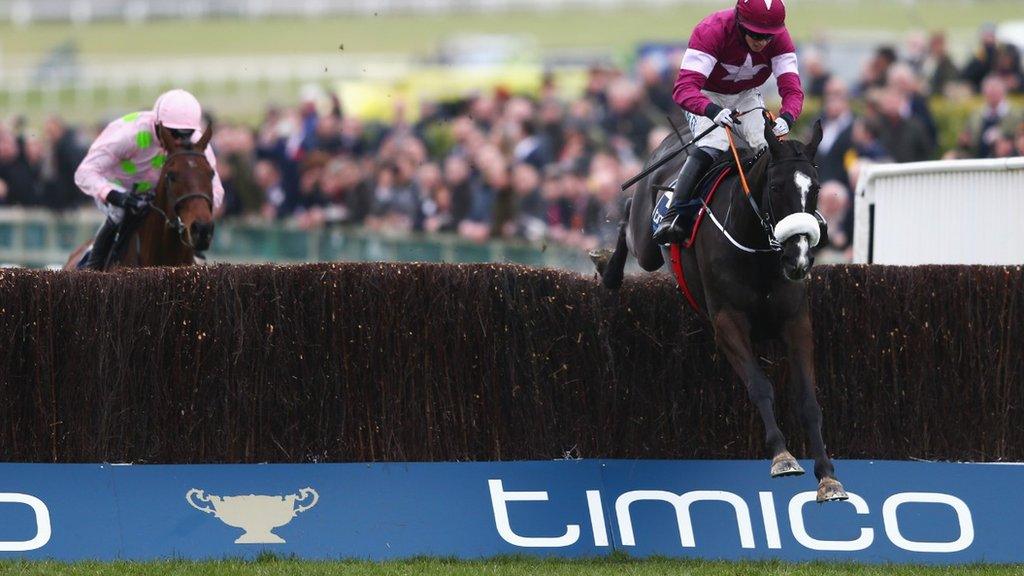
Internet services firm Timico sponsors the Gold Cup race
Hospitality prices start at £230, up to £900 for packages on Gold Cup day.
Albert and Michel Roux Jnr are hosting their premium Chez Roux pop-up restaurant across all four days of the festival.
Hospitality, along with ticket sales, are the two biggest income strands at Cheltenham, with other money coming from sponsorship, food and drink sales on the course, and also media rights.
Event sponsors include Bentley, Boodles, JCB, RSE, Guinness, Ryanair, St James Place, and Timico which backs the Gold Cup.
Irish visitors
Outside of the racing arena, academics at the University of Gloucestershire's Centre of Contemporary Accounting Research estimate that the four days of racing brings more than £100m to the Gloucestershire economy.
"That does not include spending at the racecourse itself but expenditure on things like accommodation, food and drink in the town," says Mr Renton.
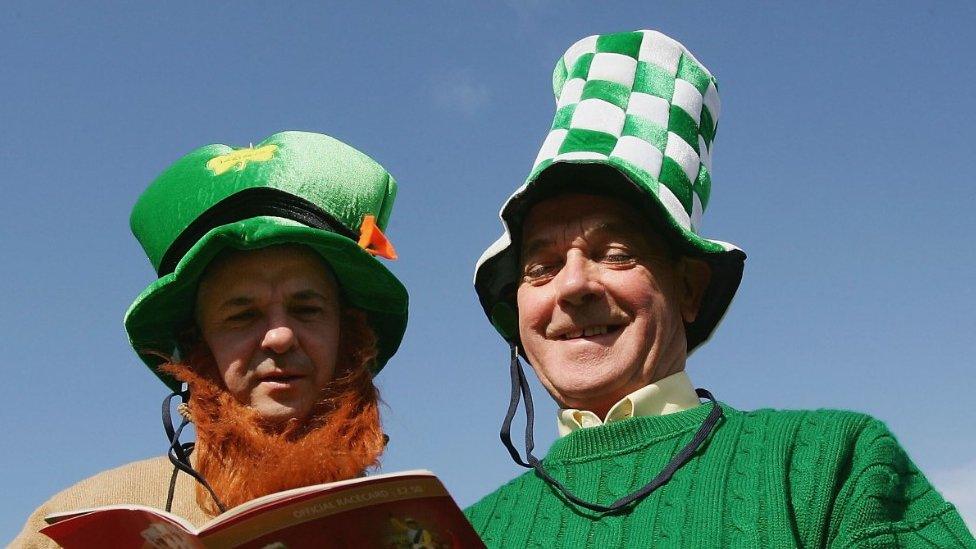
Tens of thousands of visitors from Ireland will attend the racing
"Some locals might think it is a nuisance when a quarter of a million people descend on them, but most are very tolerant and I think they realise the benefits the festival brings to the economy."
The report also points to how many people come from Ireland, stating "they make a holiday of it - they'll book up a year ahead, and save up and spend their money here".
It is estimated that the Irish make up roughly a third of the festival race-goers.
"That figure does not include UK-based Irish who will be attending," says Mr Renton.

Cheltenham Festival in numbers
£575,000 - prize money available for the Timico Cheltenham Gold Cup
70,000 - maximum capacity on Cheltenham Gold Cup Day (when all temporary facilities are open)
8,000 - gallons of tea and coffee served
5,936 - staff employed
350 - chefs on site
30 - extra flights put on by Ryanair on the Dublin-to-Birmingham route
9 - tonnes of potatoes consumed
5 - tonnes of smoked and fresh salmon consumed

'Proper say'
The festival comes at an important time for UK horse racing.
The new TV deal will see the ITV main channel showing more than 40 days a year of the sport, including all the top-tier fixtures, and around 60 more days will be shown on ITV4.
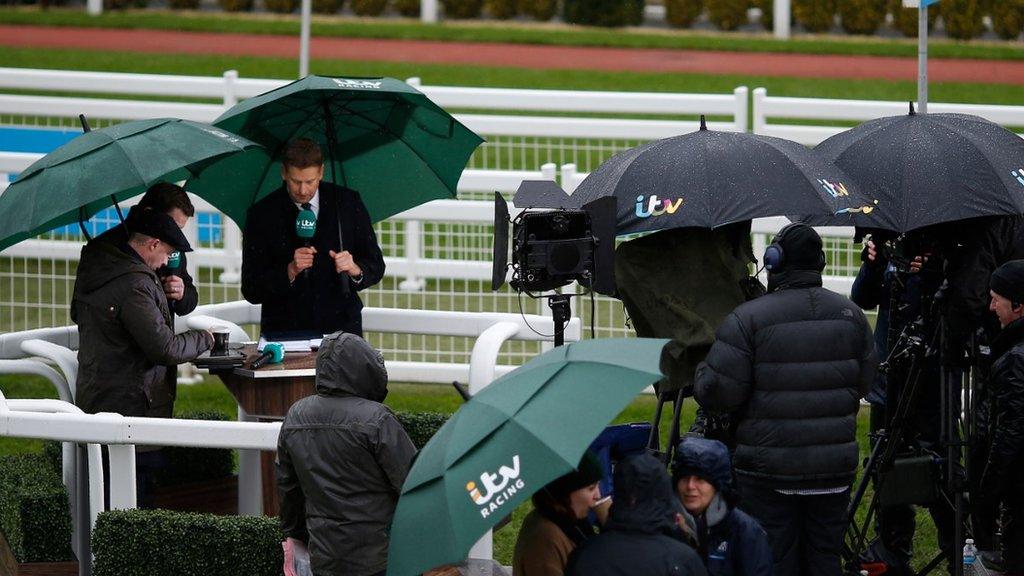
ITV will cover UK racing for four years
In addition a new "tripartite" governance agreement for the sport has been drawn up by governing body the BHA, the racecourses and racing participants.
"British racing has a really effective governance structure now in place that gives the three stakeholder groupings in the sport a proper say on the big decisions," says Jockey Club chief executive Simon Bazalgette.
"That uniting purpose and structure we've all committed to means the sport can make progress without being bogged down in committees or being entirely at the discretion of one super-powerful individual or organisation."
'Level playing field'
Another area of focus for the sport is making it appealing to the next generation.
"We need to find ways to be interesting and relevant to young people on their terms, including through digital channels, new technologies and the mainstream appeal of our media partners," says Mr Bazalgette.
Meanwhile, from April, British horse racing will benefit from mandatory contributions from all major gambling businesses that take bets on the sport in the UK.
It means any gambling business that takes bets from consumers based in the UK on races held in this country will pay 10% of their gross profits from racing - above the first £500,000 they make - to support the sport and the equine industry.
It will be enforced via a reformed statutory Horserace Betting Levy, which Mr Bazalgette says will "provide a level playing field for all betting firms to compete and long-term certainty and sustainability for British racing".